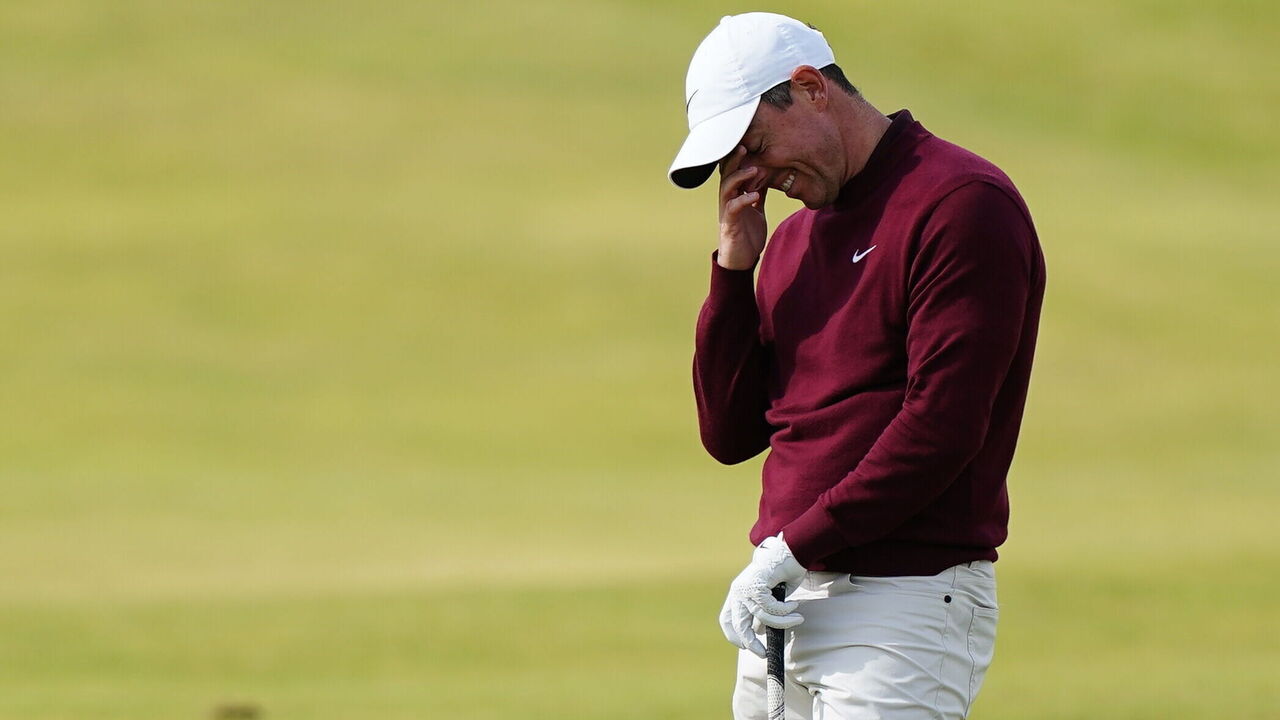Rory admitted he gave up at The Open, and that's disappointing
When competitors enter the arena, you want them to compete. It's the most basic expectation in any sport, at any level.
In golf, though, it's hard to notice when someone has given up. Golfers who have called it quits can still make birdies, and bogeys are equally as likely regardless of a player's mindset. In basketball or football, meanwhile, a player's effort level is far more obvious.
As a fan, you'd like to think golfers are doing everything possible to shoot the best score, regardless of their standing on the leaderboard. Maybe that's unrealistic and ignores human nature, but it seems like a low standard to hold the best golfers in the world to, especially at a major championship.
So when Rory McIlroy admitted he gave up in the middle of his second round at the Open Championship, it was disappointing to hear.
McIlroy put himself in a bad position after an opening-round 78. He had little to no chance of winning the tournament and an uphill battle to make the cut.
Qualifying for the weekend became a lot steeper of a climb after he made an eight on the par-5 fourth during Round 2. The triple-bogey dropped him to 11-over par, five shots off the eventual cutline.
That's when McIlroy gave up.
"I think once I made the eight on the fourth hole, that was it," McIlroy said. "Twenty-two holes into the event and I'm thinking about where I'm going to go on vacation next week."
He added: "I knew from then I'd sort of resigned myself to the fact that I wasn't going to shoot, whatever it is, 4- or 5-under from there on in to make the cut. ... It was a pretty meaningless 14 holes after that."
Perhaps these are throwaway comments from McIlroy, who was venting while attempting to make light of another missed opportunity at a major. But he said what he said, and revealing he checked out mentally while describing 14 holes of major championship golf as "meaningless" is a shocking confession.

What makes McIlroy's remarks even tougher to digest is that there were multiple instances on Friday where a player's performance contradicted his way of thinking.
First, Joaquin Niemann made an eight on the par-3 eighth hole. His round could have been ruined, but he battled back by playing the remaining 10 holes at 4-under par.
Then there was Robert MacIntyre, who was in a scenario similar to McIlroy's. MacIntyre was 8-over in his first four holes of Round 2 (DataGolf gave him a 1% chance of making the cut at that point).
He was also days removed from an emotional victory at the Scottish Open. He easily could have taken his foot off the gas, ended his week at Royal Troon early, and continued celebrating the most important victory of his career.
Instead, MacIntyre played his final 14 holes - the same amount McIlroy called meaningless - at 4-under par to make the cut by one shot.
Birdies were out there for McIlroy to make. Shooting 5-under on his final 14 holes wasn't impossible, but in his mind it was, and he took himself out of the fight before the fight was over.
A rebuttal is that made cuts don't mean anything to McIlroy at this point in his career. That could be true, but that's also a sad reflection on the current state of pro golf.
In a sport where the saying "you eat what you kill" applies, made cuts should mean something. There are almost as many tournaments without a cut as those with one. McIlroy's been a proponent for more events with a cut, but he's also benefited financially from those without one.
Tiger Woods always prided himself on his ability to play weekend golf, even with his C- or D-game. Tiger's 142 made-cuts streak is a testament to that and remains one of the most untouchable records in professional sports.
“You can’t win a tournament unless you make the cut," Tiger said at this year's PGA Championship. "That’s the whole idea is get to the weekend so that you can participate and have a chance to win."
Woods added: "I've been on the cut number and have won tournaments. ... But you have to get to the weekend in order to win a golf tournament."
Max Homa channeled this Tiger-like energy in his second round at Royal Troon when he birdied two of his final three holes to make the cut on the number.
When his 28-footer dropped on 18, Homa celebrated as if he'd won the tournament. McIlroy, coincidentally, had a front-row seat.
This is what it means. @Maxhoma with a birdie on the last to keep his Open dream alive.
— The Open (@TheOpen) July 19, 2024
Clutch. pic.twitter.com/ANbcn3iOIc
"I'm just proud of myself," Homa said Friday. "This is my favourite tournament in the world. So to have the chance to potentially play two more days, I don't know, I had an out-of-body experience. I didn't really expect to yell like I won a golf tournament. It just felt really good. I felt like I fought all day."
Being prideful and fighting for the weekend - two things McIlroy could have tried to do in the face of adversity.
But he didn't. And that's disappointing.